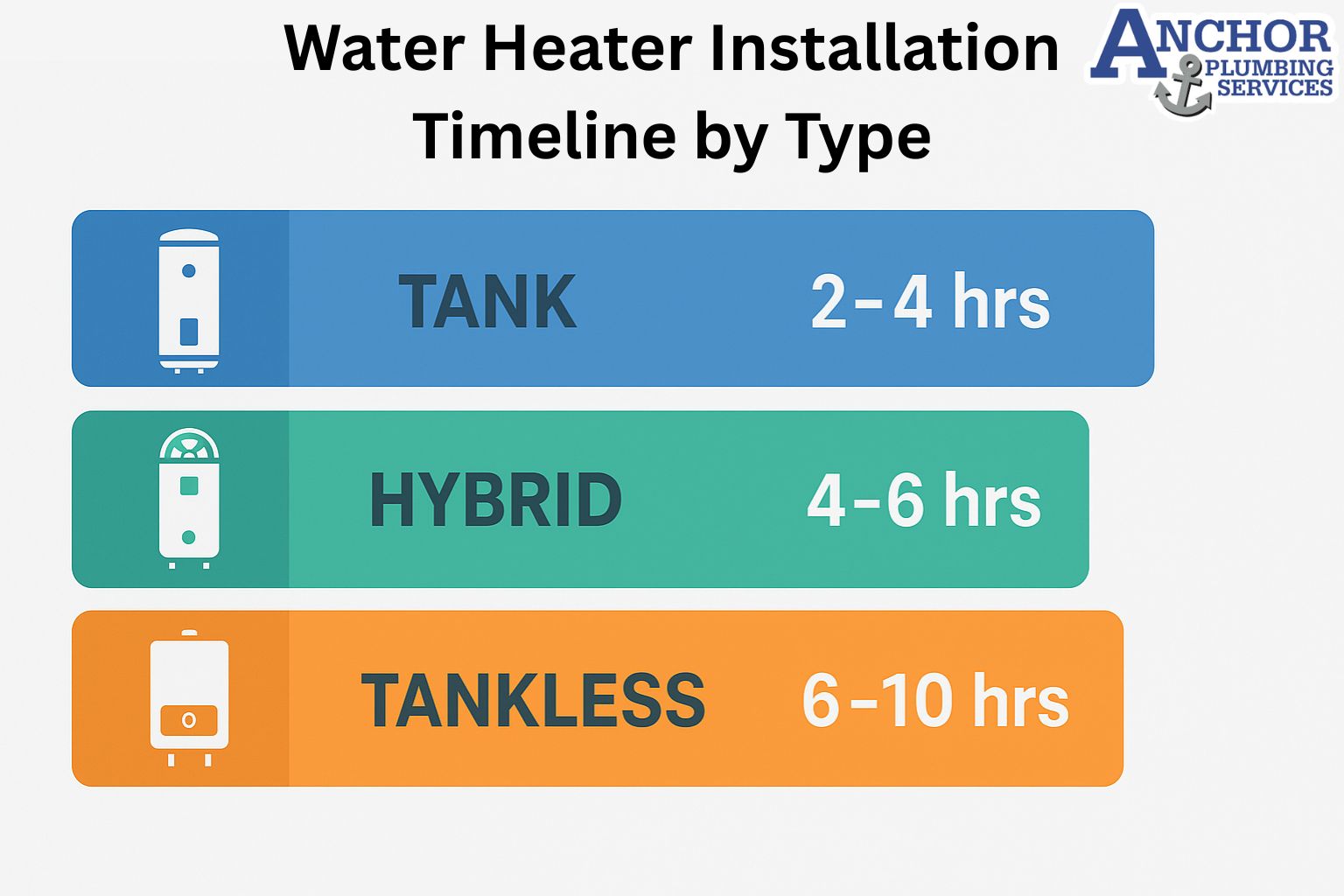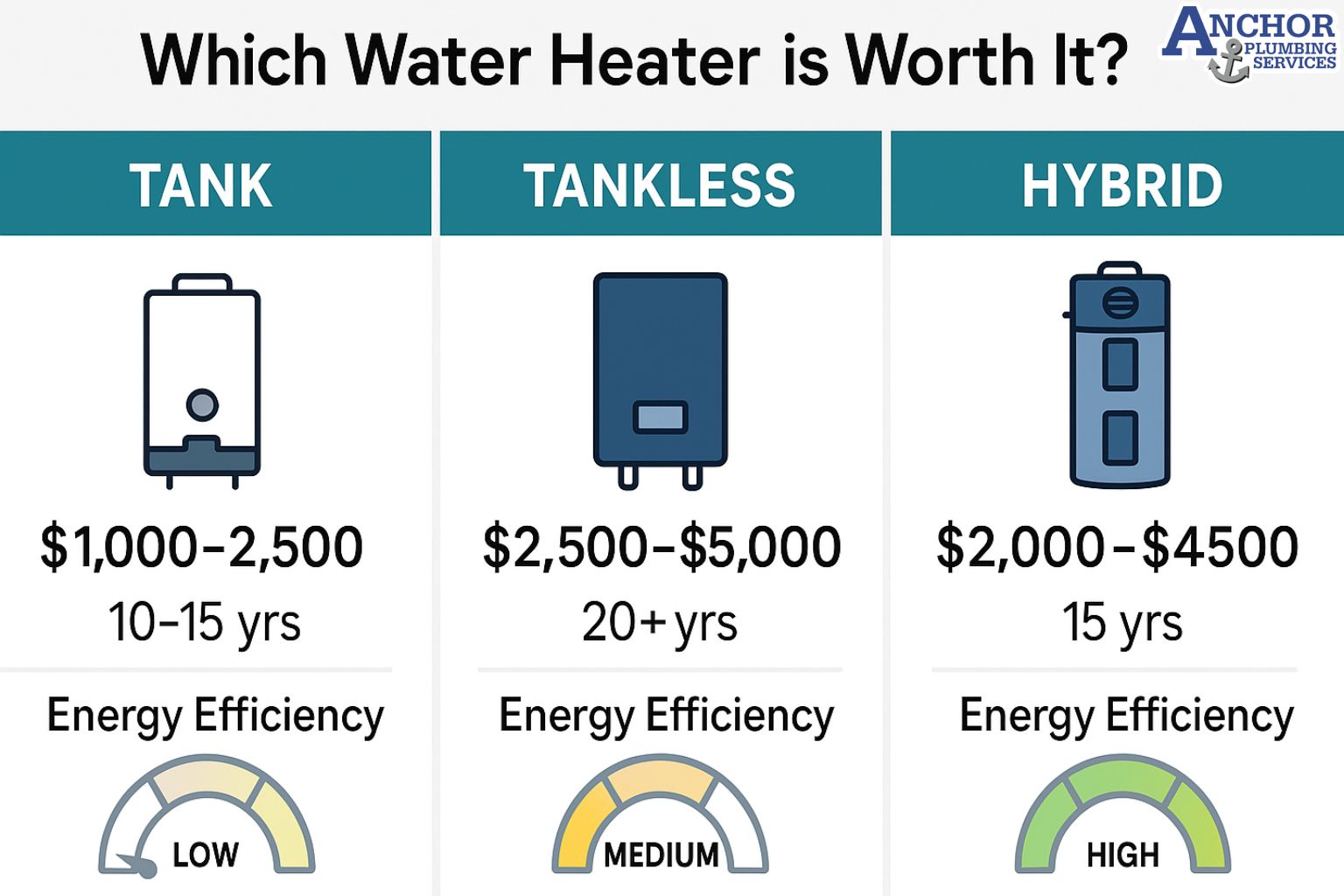Water heater installation typically costs between $1,000 and $5,000, depending on the unit type, size, and complexity of the setup. Most homeowners pay around $1,500 to $3,000 for a standard installation that includes both labor and materials. Costs vary based on whether you choose a tank, tankless, or hybrid system, as well as the existing plumbing and electrical connections. A licensed plumbing service ensures the installation meets local codes and includes safe setup, disposal of the old unit, and complete testing for leaks and temperature regulation.
Professional water heater installation provides long-term reliability, improves energy efficiency, and prevents safety risks associated with DIY setups. Investing in proper installation helps extend the life of your water heater while ensuring optimal performance for your home’s daily hot water needs.
What Factors Affect Water Heater Installation Cost?
The cost of water heater installation depends on several key factors that influence both labor and materials. Understanding these cost drivers helps homeowners make informed decisions before purchasing a new unit.
Key factors include:
- Heater Type: Tank, tankless, or hybrid systems each have unique installation requirements.
- Fuel Source: Gas units often need venting and gas line connections, while electric models may require upgraded wiring.
- Heater Size and Capacity: Larger gallon tanks or higher flow rate units increase both material and labor costs.
- Accessibility: Limited space or tight installations (such as attics or closets) take longer and require more labor.
- Venting and Plumbing Adjustments: Replacing vent pipes, drain pans, or water lines adds to the total price.
- Local Labor Rates: Installation costs can differ by city or region depending on permit fees and technician rates.
Technicians assess the home’s plumbing and electrical layout to estimate pricing accurately. Choosing the right unit for your space and water usage ensures long-term savings on energy and maintenance.
Tank Water Heater Installation Cost
Tank water heaters are the most common and cost-effective option for most homes. Installation costs typically range between $1,000 and $2,500, including labor, materials, and removal of the old unit. The total cost depends on tank size, power source, and energy efficiency rating.
Typical pricing examples:
- 40-gallon electric heater: $1,000–$1,400 installed
- 50-gallon gas heater: $1,300–$1,800 installed
- 80-gallon high-efficiency unit: $1,800–$2,500 installed
Gas-powered tank heaters may cost slightly more to install due to venting and gas line work, while electric models usually have lower setup costs but higher energy use.
Tank units generally last 10 to 15 years and provide reliable, consistent hot water for families. Although they have a lower upfront price, tank models use more energy to keep water heated continuously. Professional installation ensures the tank is properly vented, pressure-tested, and compliant with plumbing codes for safe operation.
Tankless Water Heater Installation Cost
Tankless water heaters cost more to install because they require upgraded venting, electrical, and gas line connections. The total installation cost typically ranges from $2,500 to $5,000, depending on the unit’s capacity and the home’s plumbing configuration. Most projects take 6 to 10 hours to complete since technicians must retrofit the system to handle higher water pressure and temperature output.
Tankless, or on-demand systems, heat water only when needed, which significantly improves energy efficiency compared to traditional tanks. Although the upfront investment is higher, homeowners save on monthly energy bills and gain a longer system lifespan — usually 20 years or more.
High efficiency and space savings offset the initial expense. Tankless water heaters are compact and ideal for smaller homes or households with high hot water demand. Professional installation ensures proper venting and prevents gas leaks or electrical overloads that can occur with improper DIY setup.
Hybrid Heat Pump Water Heater Installation Cost
Hybrid water heaters cost more upfront but offer the best long-term savings through reduced energy consumption. Installation typically costs between $2,000 and $4,500, including both labor and materials. These systems combine a heat pump with electric heating elements to extract warmth from surrounding air and heat the water efficiently.
Proper ventilation and space are required for efficient operation since the heat pump draws ambient air to function. Installations in garages or utility areas with adequate airflow deliver the best performance. Many homeowners qualify for energy rebates or tax credits due to the high efficiency of these systems, which can reduce total cost by several hundred dollars.
Hybrid models have an energy factor two to three times higher than conventional electric units and can last up to 15 years with routine maintenance. The higher initial investment pays off through lower utility bills and eligibility for incentive programs.
How Much Does Labor Cost for Water Heater Installation?

Most licensed plumbers charge between $50 and $150 per hour, depending on location, experience, and project complexity. Labor represents a significant portion of water heater installation cost.
Average installation times vary by unit type:
- Tank water heaters: 2 to 4 hours
- Tankless water heaters: 6 to 10 hours
- Hybrid heat pump systems: 4 to 6 hours
Labor costs increase when technicians need to reroute plumbing, upgrade venting, or install new gas or electrical lines. Additional time may be required for permits, safety checks, and testing.
Hiring a licensed plumber ensures the system meets local codes and performs efficiently from the start. Professional installation protects your manufacturer warranty and minimizes long-term repair risks caused by improper setup or incorrect connections.
Need a New Water Heater Installed? We’re Ready to Help 210-843-5800
Schedule Online
Are There Additional Costs Homeowners Should Expect?
Some cities require plumbing permits that add to total installation cost. Homeowners should be aware that water heater installation can involve several additional expenses beyond the base equipment and labor charges. These variable costs depend on local regulations, home layout, and the condition of existing plumbing or electrical connections.
Common additional costs include:
- Permit and inspection fees: Many municipalities require plumbing permits and post-installation inspections to ensure code compliance. These fees typically range from $50 to $250.
- Disposal of the old unit: Removing and properly disposing of an existing water heater may add $50 to $150 to the total bill.
- Gas or electrical line upgrades: If a tankless or hybrid unit requires upgraded wiring, breakers, or gas lines, the cost can increase by several hundred dollars.
- Expansion tank or drip pan installation: These accessories are often required by modern codes to prevent pressure buildup and protect against leaks, adding $100 to $300 depending on materials.
Code compliance, permit requirements, and infrastructure upgrades all influence final pricing. A professional plumbing service includes these considerations in a detailed quote, ensuring there are no unexpected charges after installation.
How Much Does It Cost to Replace vs. Install a New Water Heater?
Replacing an existing water heater usually costs less than installing a brand-new system. When a plumber can use existing hookups for gas, water, or electrical connections, it reduces both labor time and material expenses.
Typical pricing comparison:
- Replacement installation: $1,000 to $2,500
- New installation (no prior hookups): $2,500 to $5,000
Replacement projects require disconnecting and removing the old unit, connecting the new heater to existing lines, and testing for leaks and temperature consistency. A new installation often involves retrofitting, such as adding new plumbing connections, venting systems, or electrical upgrades, which increases cost and installation time.
Homeowners benefit from professional assessments before installation to determine whether the current setup can support a modern, energy-efficient unit. Reusing compatible connections where possible helps minimize cost without sacrificing safety or performance.
How Can You Save Money on Water Heater Installation?
You can lower installation costs by comparing quotes, claiming rebates, and planning your project strategically. Smart budgeting and proper timing can reduce both upfront and long-term expenses without compromising quality or safety.
Practical ways to save include:
- Compare multiple quotes: Request estimates from licensed plumbers to find transparent pricing and verify what each service includes.
- Schedule during off-season: Installation rates are often lower in non-peak months when demand decreases.
- Claim rebates for ENERGY STAR models: Many utility companies and state programs offer energy efficiency credits or cash-back incentives for certified models.
- Bundle plumbing services: Combining installations or maintenance visits can qualify you for package discounts or reduced service fees.
Homeowners who invest in efficient systems such as ENERGY STAR-rated models can save up to 20% annually on water heating costs. Maintenance plans and loyalty programs from reputable plumbing companies may also include annual tune-ups or priority service, adding long-term value beyond the initial installation.
Should You Hire a Professional or Try DIY Installation?
DIY installation violates local building codes and voids manufacturer warranties. While installing a water heater yourself may seem cost-effective, it carries significant risks including gas leaks, electrical hazards, or poor system performance if not installed correctly.
Hiring a professional plumber ensures full code compliance, safety certification, and warranty protection. Licensed technicians verify gas pressure, electrical load, venting, and drainage before activating the unit. They also handle permits and perform post-installation safety inspections to confirm proper operation.
Professional installation minimizes liability and guarantees your system performs efficiently from day one. The added peace of mind, safety, and long-term reliability make professional installation the smarter investment for any homeowner replacing or upgrading their water heater.
Frequently Asked Questions About Water Heater Installation Costs
How much does a 40-gallon heater cost to install?
A 40-gallon water heater typically costs between $1,200 and $2,000 to install, depending on brand, labor rates, and whether new connections or permits are required.What’s the cost difference between gas and electric?
Gas models cost slightly more to install due to venting and gas line requirements, but they often lower monthly energy bills compared to electric models.How long does installation take?
Most water heater installations take 2 to 6 hours, depending on the type of unit and any upgrades needed for electrical or plumbing connections.Does insurance cover replacement?
Homeowners insurance usually does not cover replacement unless the water heater failure results from a sudden, accidental event such as a burst tank or flood-related damage.Conclusion: Is a New Water Heater Worth the Installation Cost?
Installing a new water heater is an investment in comfort, energy efficiency, and long-term reliability. The average installation cost ranges between $1,000 and $5,000, depending on the type of system, home configuration, and local labor rates.
Modern systems such as tankless and hybrid water heaters deliver better energy efficiency, faster heating, and lower utility bills, often paying for themselves over time. Replacing an outdated or inefficient unit also helps maintain consistent water temperature and reduces the risk of leaks or corrosion.
Professional installation ensures safe, efficient performance and compliance with building codes. Anchor Plumbing Services provides licensed water heater installation with transparent pricing and expert craftsmanship across San Antonio. Our team delivers lasting comfort and dependable hot water solutions backed by a satisfaction guarantee.


